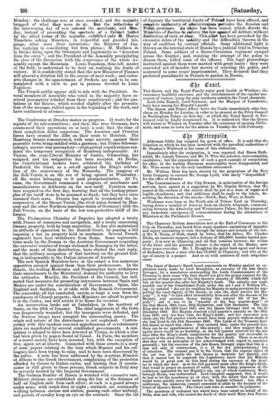The Conference at Dresden makes no progress. It waits for
the reports of its sub-committees ; and they, like true Germans have commenced their operations on so large a scale that the time of their completion defies conjecture. The Austrian and Prussian forces have crossed the Elbe on their route to Milstein. The Hamburg Senate remonstrated, with some naivete, against their peaceable town being saddled with a garrison ; but Prince Schwarz- enberg's answer was peremptory—strategetieal considerations ren- dered the temporary occupation of Hamburg indispensable. At Vienna, the semi-Liberal Minister of Justice, Schmerling, has resigned, and his resignation has been accepted. At Berlin, the Constitutional leaders have celebrated the birthday of Frederick the Great, as a set-off against the King's celebra- tion of the anniversary of the Monarchy. The congress of the Zoll-Verein is on the eve of being opened at Wiesbaden : all the states belonging to it send plenipotentiaries. At Vi- enna, the Government summoned a congress of merchants and manufacturers to deliberate on the new tariff. Fourteen mem- bers resigned on the first day, learning that all the leading princi- ples of the tariff were to be assumed as fixed; but they have since resumed their seats. Prussia has agreed to recommend the in- corporation of the Steuer-Verein (the rival union formed by Han- over and the other Northern maritnne states of Germany) with the Zoll-Verein, on the basis of the low non-protective tariff of the former.
The Piedmontese Chamber of Deputies has adopted a treaty with France of commerce and navigation, and a treaty concerning literary property, both by large majorities. It has also maintained its attitude of opposition to the Romisk Court, by passing a bill imposing a tax on property held in mortmain. Several French regiments have been withdrawn from Rome. Some representa- tions made by the Roman to the Austrian Government respecting the excessive number of troops stationed in Romagna by the latter, and the mode of their distribution have elicited the curt reply, that the military occupation of that territory on the present foot- ing is indispensable to the Italian interests of Austria.
The new Spanish Ministers have at the outset a less numerous opposition arrayed against them than their predecessors. In the Senate, the leading Moderates and Progressistas have withdrawn their amendments to the Ministerial demand for authority to levy the estimates. Murillo, the President of the Council, has inti- mated that measures for promoting intercourse between Spain and Mexico are under the consideration of Government. Spain, like England and .Sardinia, is at odds with the Romish Government. The concordat, all but concluded, exacts so large a sum from the purchasers of Church property, that Ministers are afraid to present it to the Cortes, and will return it to Rome for revision.
An insurrection broke out at Interlaken, in the territory of Berne on the 20th of January. The chief magistrate of the town was Berate, wounded ; but the insurgents were defeated, and the Bernese troops have occupied the surrounding passes. The origin and nature of the disturbance is not explained. Contem- porary with this incident renewed apprehensions of revolutionary plots are manifested by several established governments. A con- spiracy is alleged to have been detected at Vienna, to which a clue had been given by papers found at CasseL In Paris, the members of a secret society have been arrested, but, with the exception of five, again set at liberty. Connected with these arrests is a story of some papers relating to the loan which Mazzini and his col- leagues have been trying to raise, said to have been discovered by the police. A note has been addressed by the Austrian Minister at Athens to the Greek Government, complaining of the protection afforded by Greece to Italian exiles, and hinting that if counte- nance is still given to those persons Greek subjects in Italy may be severely treated by the Imperial persons, The German frontier of Russia is watched with excessive care. Military stations are established along the line at the distance of half an English mile from each other; at each is a guard always under arms, with watch-fires at night ; sentinels are continually olking between station and station, passing each other midway, and patrols of cavalry keep an eye on the sentinels. Since the 1st
of January the territorial limits of Poland have been effaced, and alSglete uniformity- ofgaainistastiaa pervades the Russian and 'PCS& provinces. Ai ease has been issued, which directs the Ministers oflastios le enforce dna law agoinst all debtors without distinction ctrank ors. This edit. has.been provoked by the excessive debts of the nubility and the difficulties thrown in the way of creditors by corrupt officials. Some additional light is thrown on the internal state of Russia by a judicial trial in Prussian Poland. Some soldiers of a Russo-Circassian regiment escaped across the frontier ; and, resisting the attempt of the police to disarm them, killed some of the officers. The legal proceedings instituted against them were marked with great lenity : they were convicted not of murder but merely of resisting the police, and sentenced to some years' imprisonment. They declared that they preferred punishment in Prussia to pardon in Russia.


























 Previous page
Previous page